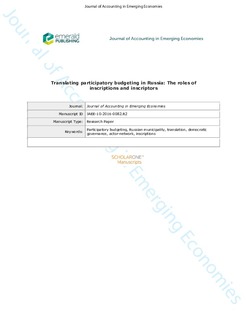Translating participatory budgeting in Russia : the roles of inscriptions and inscriptors
Journal article, Peer reviewed
Accepted version
Permanent lenke
http://hdl.handle.net/11250/2505381Utgivelsesdato
2018Metadata
Vis full innførselSamlinger
Originalversjon
Aleksandrov, E. & Timochenko, K. Y. (2018). Translating participatory budgeting in Russia: the roles of inscriptions and inscriptors. Journal of Accounting in Emerging Economies. doi: 10.1108/JAEE-10-2016-0082Sammendrag
Purpose – The paper explores how participatory budgeting (PB) as a democratic governance tool has been translated within the Russian public sector by addressing the local specifics of its design and mobilization through the formation of networks.
Design/methodology/approach – The paper is based on a case study of one pioneering municipality. Data has been gathered through triangulation of interviews, document search, video and netnographic observations. By relying on ideas from actor-network theory, the study focuses on the relational and rhetorical work of human (allies/inscriptors) and non-human (inscriptions) actors involved in the development of PB in Russia.
Findings – The findings indicate that the initial democratic values of PB underwent several stages of translation as a continuous inscription building process and the formation of networks. The main finding is that putting democratic idea(l)s of PB into practice proved problematic, since PB depended on many ‘allies’ which were not always democratic. Paradoxically, in order to launch democratic practices in Russia, PB relied largely on bureaucratic and even New Public Management inscriptions, which it was originally supposed to fight against. Notwithstanding, while these inscriptions can fog the democratic values of PB, they are also capable of uncovering its democratic potential over time, albeit not for a long time as the ‘external referee’ is needed.
Originality/value – The paper juxtaposes PB development in Russia with the translation literature. Not only does the study emphasize the role of human, but non-human actors as well.
Beskrivelse
Author's accepted version (post-print).
